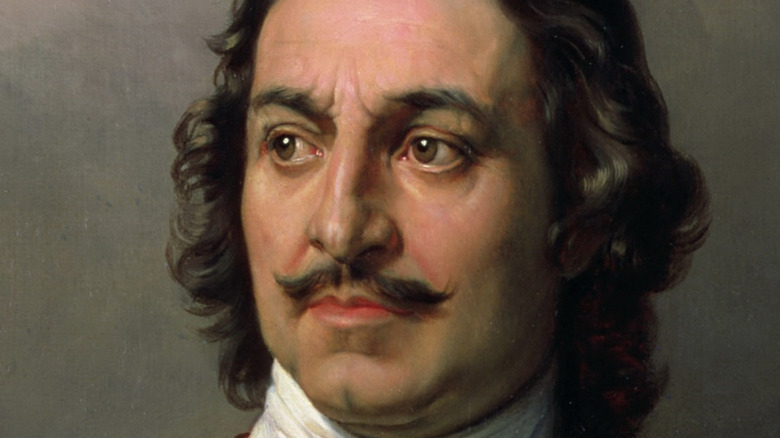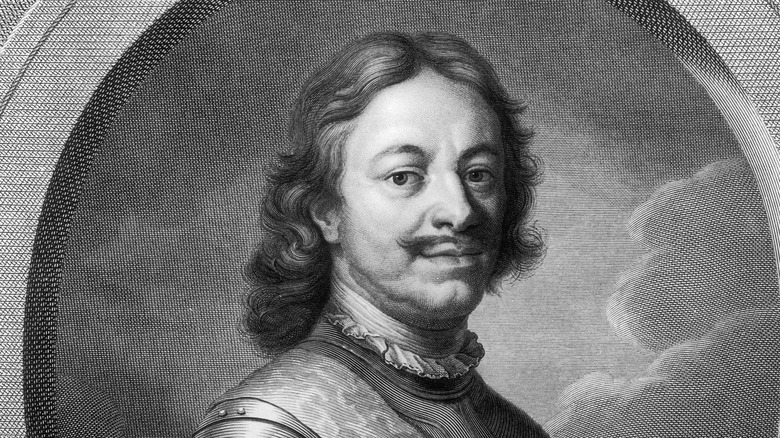Why Did Peter The Great Create A Beard Tax?
Rulers don't tend to be given the epithet "the Great" for nothing. Take Alexander the Great, for instance. As History reports, he was just 32 when he died in 323 B.C., but he shaped the ancient world around himself, creating one of the largest and most influential empires in history. Then there's Wayne Gretzky, NHL legend who was given the nickname The Great One. Granted, that isn't the same thing at all, but to Gretzky's many, many fans, it might as well be.
Peter the Great may not have the proud achievements of Gretzky, but he certainly has numerous intriguing claims to fame of his own. According to Britannica, Peter I ruled Russia from 1682 until his death in February of 1725. For the final four years of his reign, he was deemed emperor, having been joint-tsar with half-brother Ivan V from the beginning of his rule until 1696. Peter could be a harsh ruler, but he respected all on their merits rather than their station at birth, worked as hard as anybody, and elevated the nation to a cultural and intellectual powerhouse.
He also, famously, introduced a tax on beards.
Peter the Great loved European fashions
During Peter's time, Russia had limited access to much of the European continent, per Britannica. To familiarize his nation with the wider continent, Peter set out with the Grand Embassy in 1697. This tour had various objectives, but the 250-strong party also saw the tsar (under the name Sgt. Pyotr Mikhaylov) getting a first-hand experience of life in Western Europe. Among other things, he worked in a Royal Navy dockyard in Britain and spent several months with the Dutch East India Company.
Peter's conclusion was that his nation should adopt more of the styles and culture he experienced in Europe. Per JSTOR Daily, he wasted no time in encouraging this. He advocated for the wearing of jackets of European design, rather than the heavier garments that had been the norm in Russia. He discouraged clothing sellers from offering them.
Beards, it seemed, had very little place in Peter's new vision for Russia either. In "Diary of an Austrian Secretary of Legation at the Court of Czar Peter the Great," Johann-Geeorg Korb described what happened on Peter's return to Russia. Knes Alexis Simonowicz Schahin, General-in-Chief of the army, was reportedly "the first who submitted the encumbrance of his long beard to the razor," a razor which "plied promiscuously among the beards of those present."
The unpopular beard tax outlived Peter himself
In "Diary of an Austrian Secretary of Legation at the Court of Czar Peter the Great," Johann-Geeorg Korb goes on to explain that the freshly clean-shaven courtiers surrendered their beards willingly, as Peter himself had done so before them. "Their sovereign is the first to show the example ... their sovereign to whose wish or command they deem it a holy and religious act to devote their lives," Korb wrote.
Per Mental Floss, Peter's anti-beard stance was challenged. The Russian Orthodox Church considered shaving to be tantamount to blasphemy. He decided to take a different tack: Instead of outright banning beards, he attempted to bolster his coffers and reduce his nation's facial hair into the bargain by taxing them. According to the U.S. Department of State, the beard tax varied depending on the status of the beard-owner in question: from a single kopek to a hefty 100 rubles per year for richer citizens.
In exchange, the beard-wearer was given a sort of coin as proof that they had paid the tax that year. The tax continued to be enforced until 1772.


